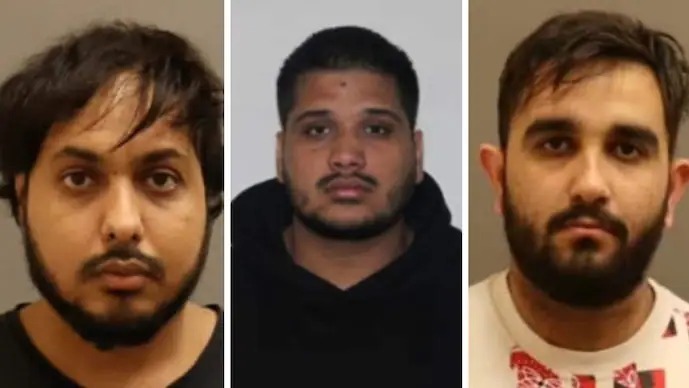In June 2023, Canadian police apprehended three Indian men linked to the Bishnoi gang for the assassination of Khalistani terrorist Hardeep Singh Nijjar.
Canadian Prime Minister Justin Trudeau, at a Sikh Foundation event in Ontario, affirmed their arrest, emphasizing Canada's commitment to law and order.
The investigation into Nijjar's homicide extends beyond the arrest of these individuals, Trudeau assured.
Who are the trio?
Karan Brar, Kamalpreet Singh, and Karanpreet Singh, all aged in their 20s, were seized due to their initials 'K', forming the so-called K Group. They all resided in Edmonton, Canada.
The suspects migrated to Canada on temporary visas in 2021, some held student visas but none attended school. They face charges of murder and conspiracy and appeared before a Vancouver court.
Ties with Lawrence Bishnoi's gang?
Arrested individuals are said to be linked to criminal factions in Haryana and Punjab, specifically the Lawrence Bishnoi gang. Canada police speculate Bishnoi's involvement in another Khalistani terrorist Sukha Duneke's death, a claim uncovered by Aaj Tak/India Today post the assassination.
Further investigations probe any Indian government complicity.
Shinder Purewal, a political science professor at Kwantlen Polytechnic University, revealed despite Bishnoi's 2014 imprisonment, he still directs a substantial gang, including around 700 gunmen even in Canada.
Recent years saw Trudeau's government vocal on Sikh interests, with a significant voter base. Canadian population census of 2021 notes approximately 1.6 million of Indian origin, including nearly 770,000 Sikhs.
In light of Nijjar's killing, foreign minister Jaishankar dismissed Trudeau's implications against India, attributing it to Canada's internal politics and impending elections.
Jaishankar criticized Canada for creating a voting bloc and providing platforms to Khalistan sympathizers and reiterated India's attempts to dissuade Canada from offering visas or political space to problematic individuals. Despite India's efforts, the Canadian government remains unresponsive.
Trudeau's NDP ally, Jagmeet Singh, is known for his Khalistan support, highlighting Trudeau's reluctance to act against Khalistani elements due to political risks.
Last year, Trudeau accused India of Nijjar's murder, straining diplomatic ties. The accusation dovetails with the fluctuating relations and political maneuvering by both nations.
Former security advisor Jody Thomas asserted India's cooperation with Canada on the homicide investigation. Nijjar, dubbed the Khalistan Tiger Force chief, had been a long-term Canadian resident and a significant adversary for Indian agencies for amplifying Khalistani terrorism and facilitating logistics and funds to the Bishnoi gang affiliates abroad.
On his 2018 India visit, Trudeau was warned by Punjab's then-chief minister Amarinder Singh of Khalistani militants like Nijjar. Declared a terrorist by India's Ministry of Home Affairs, Nijjar was sought for various criminal charges.
India pronounced Nijjar a designated terrorist, with the NIA announcing a reward on him, signifying the grave threat he personified.




